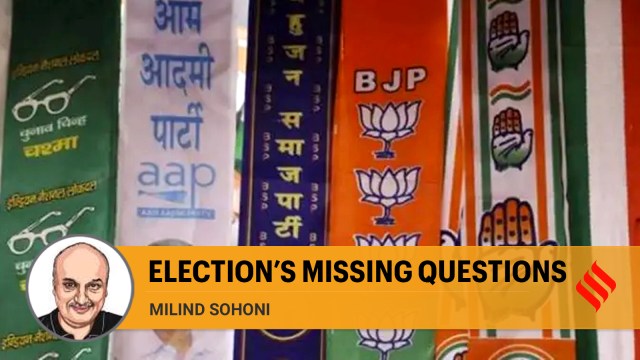
As we approach the elections, one question repeatedly asked is “how are we faring as a democracy?”. The answer depends on who you ask. A taxi driver, a college student or her retired father will offer very different answers on what constitutes democracy and what they expect from it. For most Indians though, it has three key features — free and fair elections, an elected body which guides and makes laws, and an executive state which implements them. On these three counts, we get just about passing marks.
On the other hand, some international agencies now call us an “electoral autocracy”. The Economist calls us a flawed democracy and ranks us at 41, between Malaysia and Poland. These agencies use additional indicators such as freedom to publish articles, make associations, practise one’s religion, and the right to fair trial. Our own liberals bemoan the erosion of constitutional values and institutions — amongst them, citizenship, secularism, the Supreme Court, and the Election Commission. But these issues do not seem to bother most of our people. So, the question remains: What constitutes a democracy and what is it supposed to deliver to the people?
As a professor at IIT Bombay in day-to-day contact with an elite segment of our youth, I see this as an important question. In fact, many issues which affect our youth and their prospects depend on how we choose to answer it.
A functional view is to see democracy as a means for a people to progress materially, culturally and socially, through informed choice and collective action. Electoral democracy is then merely an implementation of the above grand objective. In many countries, the measurement of these conditions — of roads, employment, availability of water, the quality of universities and even the number of books published, etc — are periodically reported at the national and regional levels. Take the 132-page State of the Environment Report by Ontario State, Canada. This gives detailed information about air, water, climate and natural habitat.
To produce such reports and to provide a platform for discussion is an important agenda for the universities and scientific agencies of the country. They help identify problem areas, different perspectives and possible solutions. This also creates fresh demand for gadgets and processes and hence new jobs. It frequently leads to new science. In fact, the study of one’s own society may occupy nearly 5 per cent of the workforce, and employ some of the most sophisticated and skilled young graduates.
The bureaucracy too periodically puts out reports on the status of various indicators and informs both the people and the lawmakers about possible options. Canada’s Annual Housing Report is a 170-page document that gives important statistics and analysis of availability and affordability and various loan schemes and their performance.
It is no wonder that Canada ranks very high in most democratic as well as environmental indicators and its people are rated as some of the happiest. Thus, the knowledge and information cycle is an important part of the definition of democracy and something that brings prosperity. The right to know, the freedom to argue and the equality of the people as citizens with their bureaucrats and scientists are cornerstones of this prosperity. This is why other indices of democracy are important.
Sadly, much of this is absent in Indian society. Let us look at a typical district of Maharashtra with an average population of 30 lakh. It has a district city, a few smaller taluka places and hundreds of villages. Water supply is irregular and of poor quality, but there is no official acknowledgement. Though the expenditure on roads may be about Rs 200 crore, there is little measurement or testing. There are, of course, no maps. The district hospital has a shortage of doctors and the schools and colleges of teachers. Agricultural output depends largely on the monsoons and industrial output, on government policies. None of these issues figure in the elections, except sporadically, agriculture.
Its administration is headed by the District Collector, one of the most powerful positions in India. With about 50 colleges, and perhaps a university, she has an army of young graduates at her disposal. Scientific studies and independent reports commissioned by various departments can employ more than 2,000 of them and bring efficiency and savings, which can pay their salaries. Given our diversity, these reports will bring different perspectives and nuances to the problem. But this needs community science and collective thinking, which is absent. The IAS and our scientists and professors have neither the training nor the inclination to participate as equals in this creative exercise of democracy.
The same story repeats at the national level. As per recent reports, after Pakistan and Bangladesh, India has the most polluted air in the world. Yet, vehicle emissions continue to rise even as public transport stagnates. Such issues have huge health costs but they largely remain outside our professional world. No wonder, there are no jobs. None of these questions even figure in the elections.
Even more worrying is the quality of education. ASER reports that only about 50 per cent of youth, 14-18 years of age, could divide a 3-digit number by a single-digit number, or correctly compute time and length in a real-life situation. This points to a deeper problem: Can our people even read the reports and comprehend the problems that beset us, let alone make the right choices?
And are we a functional democracy or a nation which regularly holds elections? The answer, alas, is lost in the din.
The author teaches at IIT Bombay. Views are personal